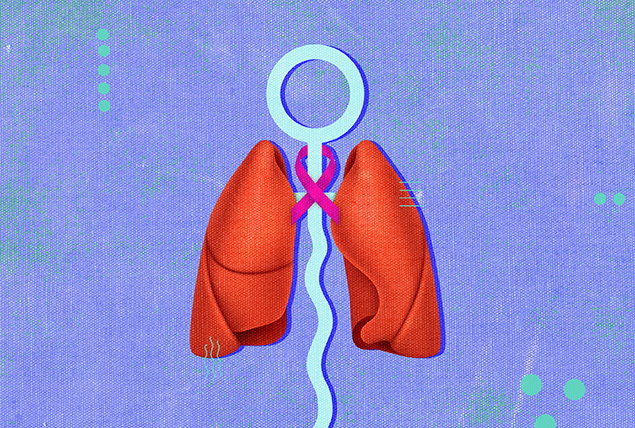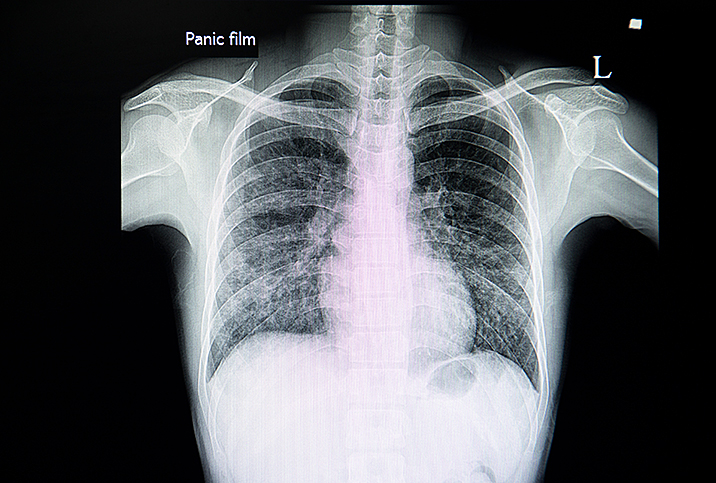Lung Cancer Substantially Affects Women's Sexual Health

Lung cancer is on the rise among women, including young women and those who have never smoked. The disease alone is life-altering, but according to a new study, people with the diagnosis are also likely to experience significant sexual side effects, including loss of libido and vaginal dryness and discomfort.
Narjust Florez (Duma), M.D., associate director for the Cancer Care Equity Program at Dana-Farber Cancer Institute in Boston, was the lead researcher of the recent Sexual Health Assessment in Women with Lung Cancer (SHAWL) study, the largest project of its kind to date. She said there was paltry research on the sexual health implications of cancer, and clinicians don't learn much about it in school, much less discuss it with their patients. She said this shortcoming is a disservice to patients, as sexual health is an integral part of overall well-being and quality of life.
"We do so many things to improve patients' quality of life, but we forget that sexual health is a pillar to quality of life," Florez said.
The international SHAWL study involved a survey asking lung cancer patients about their sexual health before their diagnosis and in the 30 days before completing the survey. Of the 249 women who participated, most had stage IV lung cancer, and 45 percent were receiving targeted therapy. Concerning their sexual health within the past month, 53 percent said they had had sexual activity with themselves or a partner; 77 percent said they had little or no interest in sex; and 67 percent said they rarely or never wanted to have sexual activity.
As for why their sex life had been affected, respondents indicated fatigue (40 percent); feeling sad or unhappy (28 percent); relationship issues (22 percent); and shortness of breath (15 percent). The study indicated substantial differences before and after a lung cancer diagnosis, especially in decreased sexual desire or interest (15 percent versus 31 percent) and vaginal pain/discomfort (13 percent versus 43 percent). Of the patients who had been sexually active in the past month, 59 percent said they had significant trouble with vaginal dryness and 26 percent noted pain or discomfort during sexual activity.
"We consider sexual health more frequently in common cancers treated with hormonal therapies like breast and prostate cancer, and those that affect body parts more strongly associated with sex and intimacy," said Susan Scott, M.D., a medical oncologist with the Johns Hopkins Kimmel Cancer Center in Washington, D.C. "Lung cancer has been relatively overlooked in terms of sexual health, which is why Dr. Florez's study is so important."
Lung cancer diagnosis is up among women
In the United States, the American Lung Association reported that the lung cancer incidence rate over the past 42 years declined 36 percent for men but rose 84 percent for women.
Florez said it's a trend seen around the world. For example, a 2022 cohort study published in the Lancet evaluated lung cancer diagnosis rates over a 20-year period in France. Out of 8,999 patients diagnosed in 82 health centers, the proportion of women increased to 34.6 percent in 2020 versus 24.3 percent in 2010 and 16 percent in 2000.
Meanwhile, in Spain, lung cancer was, for the first time, the second-leading cause of mortality in women in 2017, according to a 2019 report published in Translational Lung Cancer Research.
Scott and Florez said the incidence rate in men reached its zenith around 30 years ago and spiked for women about 20 years later, primarily due to smoking trends. Tobacco remains unequivocally the most prominent risk factor for lung cancer across demographics. But adenocarcinoma, a type of lung cancer more prevalent in women, is unrelated to smoking—and it's becoming more prevalent.
"It is an epidemic. Women are getting more lung cancer, and since 2018, young women are getting more lung cancer than young men, irrespective of smoking behaviors," Florez said, adding that there are multiple reasons.
Besides smoking, other risk factors for lung cancer include exposure to air pollution and chemicals such as radon and asbestos, a history of cancers like lymphoma or breast cancer, and a family history of lung cancer. Florez is also investigating how hormonal differences in men and women might contribute.
How lung cancer impacts sexual health
All types of cancer can affect sexual health, Scott and Florez said, due to the physical and psychological implications of the condition and treatments.But some side effects are especially prevalent in lung cancer.
Maureen Whelihan, M.D., an OB-GYN at Elite GYN Care of the Palm Beaches in Greenacres, Florida, said libido often plummets just after a cancer diagnosis, while stress, depression and anxiety arise. The psychological impact of the diagnosis can also affect a person's ability to become aroused or reach orgasm. Scott noted that hormonal changes, fatigue, pain and altered body image can impede sexual health throughout the course of the disease.
With lung cancer specifically, shortness of breath is a factor. So, too, is the stigma surrounding the disease that isn't necessarily applied to other cancer types.
"I have patients that wait in my waiting room in Dana-Farber dressed up all in pink because the stigma is so prevalent," Florez said. "These patients tell their families they have breast cancer instead of lung cancer so they don't face the stigma. That's a psychosocial aspect that affects sexuality. If you're ashamed of the cancer that you have, how are you going to be really into sexual activity?"
The taboo and gender bias surrounding women's sexuality, as well as survivor's guilt, further exacerbate the shame some patients feel, Florez said.
"The survivor's guilt is that patients feel guilty for asking for pleasure or prioritizing pleasure when they have metastatic cancer, because they feel that that's the price they need to pay to be alive," she said.
Treatments can impact sexual function as well, according to Florez and Scott. Florez said certain treatments significantly dry mucous membranes throughout the body, leading to vaginal dryness, uncomfortable or painful penetrative sex and difficulty with kissing or oral sex due to lack of saliva.
Why sexual health is important for cancer patients
There's no known relationship between sexual dysfunction and cancer outcomes, but Whelihan said there is evidence that sexually active people tend to have better overall immunity.
"Whether it's the balance in cortisol levels or growth hormones or just general circulation of endorphins, it's not quite known exactly which comes first," she said.
Florez, Scott and Whelihan added that the established connection between sexual health and quality of life can't be overemphasized. Florez said patients satisfied with their sex lives tend to need less pain and sleep medication and experience less depression, anxiety and isolation. They're also more likely to continue treatment, even if the treatment produces adverse side effects.
When patients' sexual dysfunction is addressed, the difference can be remarkable, Florez said, recalling one woman she's been treating for a year. After taking measures to improve the patient's sexual dysfunction, Florez said the woman experienced marked improvements in her overall well-being, despite worsening cancer.
"I saw her yesterday and it was like seeing a different human. Is her cancer doing better? No. Her cancer is actually doing worse. But she came dressed up with makeup, her self-esteem, she felt better. Her relationship with her partner is much better. Sexual health is part of healthcare…the impact is so large," Florez said.
"This woman came in heels with makeup for the first time, and I've known her for a year, and it's because she feels sexy again," Florez added. "She feels like the disease is not what defines her, and she's barely taking any opiates. The cancer is worse. The cancer is growing. [But] she's barely taking any opiates. She's off her Xanax. And what we did is to provide vaginal lubrication and sex positions that are easier in somebody that only has one lung."
Florez pointed out that sexual health is not only important for partnered people but also for singles; on the other hand, it is not essential for every patient. While she broaches the topic with most people, if a patient is asexual or otherwise uninterested, she moves on.
"But if we have a patient that wants to get involved in sexuality, we start with self-reflection and self-discovery," she said, adding that masturbation and self-love are crucial and can improve mental health outcomes. "Seventy percent is sexual health with yourself, and 30 percent is sexual health with others."
Treatment options
The first step to alleviating a sexual health issue—or any health issue—is to identify the root of the problem. While cancer and related treatment can contribute to sexual dysfunction, it's important to address or rule out concurrent conditions, such as menopause, vulvodynia and vulvar vestibulitis, that could have an impact.
Whelihan, Florez and Scott advised talking with a healthcare provider, and if one doesn't have answers, seek a second opinion.
"A lot of women suffer in silence," Florez said, adding that according to the SHAWL study, the number of women who had discussed their sexual health with their provider was in the single digits. "Despite these women completing a 25-minute survey about sexual dysfunction, only a few of them brought it up. The question is, who is responsible? At this point, I think it's everybody: the provider, the nurse practitioner, the physician, the patient."
Once the cause is known, most people have a preponderance of options. Whereas patients with breast cancer are precluded from using estrogen-based products, those with lung cancer can choose any treatment for vaginal dryness or painful sex that's available to any woman without cancer, Whelihan said.
These treatments include local therapies such as estradiol creams, inserts and rings, and non-estrogen products such as dehydroepiandrosterone (DHEA) vaginal ovules and CO2 laser therapy. Lubricants (commercial or coconut oil) and artificial saliva can help as well, Florez said.
"Don't be afraid to ask, because your sexual concerns are valid and there's almost always at least one solution," Whelihan said.


















